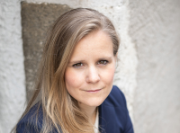The international organization Ashoka supports social entrepreneurship projects around the world. Emilie Romon Carnegie, its director in Switzerland, discusses the key drivers and challenges in this field.
An individual's innovative idea is often the source of social change. Ashoka aims to support such humanistic endeavors. The international organization brings together a global network of more than 3,700 social entrepreneurs and changemakers. It was founded in 1980 and is now active in over 100 countries. Emilie Romon Carnegie, Director of Ashoka in Switzerland, explains.
How do you define social entrepreneurship?
Emilie Romon Carnegie: This term conveys an approach involving committed individuals seeking to solve a problem they have observed. Social entrepreneurship is all about collective interest. The primary goal of a social entrepreneur is therefore not to maximize profits, but rather to increase the impact - even indirectly - of an idea, for example by establishing regulations that allow other people or organizations to replicate it. Henry Dunant is an excellent historical example of this approach. After witnessing war victims left without help, the businessman and humanist founded the Red Cross in 1863, in Geneva. Beyond the creation of his institution, his action also inspired the Geneva Conventions and contributed to building new standards in humanitarian work.
What qualities does a social entrepreneur have?
Romon Carnegie: These leaders often possess analytical and observational skills that allow them to identify a problem that needs solving, as well as empathy for people in pain. They also demonstrate creativity when it comes to imagining innovative solutions. Launching a social entrepreneurship project requires an ability to unite people around one's vision to push them, for example, to adopt new laws, create a new public service or modify market mechanisms.
What are Ashoka's objectives?
Romon Carnegie: At the heart of our approach is our support for social entrepreneurs in the development of their projects. After a rigorous selection process, we award our Fellows a three-year grant to help them focus on their concepts. They also benefit from our network of peers, strategic advice and training and mentoring opportunities. We have been present in Switzerland since 2009 and currently support 16 people.
What criteria do you apply when supporting a social entrepreneur's project?
Romon Carnegie: First, we make sure that the candidates are trustworthy individuals. We then assess scalability, i.e. the potential for development, by evaluating the impact of the innovative idea, and its ability to transform a sector or an entire industry. We expect a certain level of maturity in a project. This condition brings real added value. We also help our Fellows to step back and to think about scaling up their social enterprise. The growth of a social enterprise is quite different from that of a traditional company: where a private organization can grow through a franchise system, a social enterprise has to adopt other strategies, for example, by adopting an open source policy with data code that can be improved by anyone, or by developing new partnerships.
Can you highlight some of the projects conducted by Ashoka's Swiss members?
Romon Carnegie: Our Fellows work in a wide variety of fields. For example, we recently selected Caroline Kant, a neurobiologist from Geneva, who is working to develop new treatments for rare diseases through the EspeRare Foundation, notably by seeking to encourage pharmaceutical companies to become involved in this field. Another recent winner is Sonja Betschart, co-founder of the Vaud-based company WeRobotics, which is developing a support network to enable developing countries to establish local expertise in technology, and thus better respond to the most pressing needs of their communities.
How is Switzerland positioned in terms of social entrepreneurship today?
Romon Carnegie: Switzerland still lags behind its neighbors. The prevailing mindset for a long time was that there were no issues at the local level and that we could just send money to foreign countries. This approach ignores that many problems are global in nature, for example in ecology. But we are now seeing a growing awareness, whether it is on climate, equality or inclusion.
Swiss social entrepreneurs also need to be creative with the legal structure of their organization, juggling between traditional business and non-profit status. While there are a few limited possibilities, tax exemptions are still difficult to obtain when generating profits. This is why it is necessary to facilitate the implementation of hybrid statutes, following the examples practised today in France and Germany.






